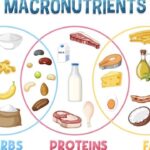Around the world, and surprisingly, even among wealthy families, it is observed that children and adults suffer from nutrition related diseases. Weak immunity, chronic diseases, and sometimes even skin problems are observed around us. This is not necessarily as a result of starvation, rather, it shows that the food such ones take lacks the essential nutrients required to build a balanced diet.
Nutrients are classified into two different broad groups: the macronutrients and theh micronutrients. We need to understand what each class entails, the benefits, why you need them and how often we should eat them. Building the complete plate is essential for good health.
Setting a healthy menu that takes into account all the essential nutrients we need is essential for our overall health and wellbeing.
Macronutrients and Micronutrients
1. Macronutrients: Macronutrients are a group of nutrients that the body requires to maintain its energy and to build up its cells and tissues. What makes it macro is that the body needs it in large quantities to maintain its functions.
The carbohydrates, fats and proteins make up the macronutrients. These foods have a high calorie content that gives energy to the body and maintains its general structure and system.
Food sources:
We will divide macronutrients into three groups namely, Carbohydrates, proteins, and fats. Let us consider food sources for each of them.
- Carbohydrates: Carbohydrates are usually sourced from energy-giving foods such as, rice, corn, yam, cassava, and other starchy foods.
- Proteins: Proteins are present in some plant-based foods such as nuts, seeds, grains, soymilk, legumes, etc.
Protein are also sourced fro animal-based foods like meats, eggs, milk, fish, and other sea creatures, etc.
- Fats: Fats are a very complicated member of the macronutrients family. This is because it hass to be taken in moderation. Too much of it can cause problems and become something to fight against.
- There are two types of fat, the healthy kind and the bad kind. The good kind can be found in food sources which include, olive oil, avocado, nuts and seeds, and oily fish. Saturated fat sources such as butter and cheese are however considered less healthier than the unsaturated ones.
2.Micronutrients: The micronutrients are likewise important for healthy living. It makes sure to maintain the cells and organs of the body as well as assisting with cognitive and nerve cell transmission. They include vitamins and minerals which are required by the body for overall growth and development.
The body needs them in smaller quantities when compared to the macronutrients. Nonetheless, they are essential to the body as it plays a crucial role in metabolism and synthesis of cells.
Without these micronutrients, you may have growth retardation, weak knees, memory retention problems and many more. Put simply, you will cause harm to your body’s development.
Micronutrients are like gold, they are hard to get. This means that the body does not produce its supply of it. It must be gotten from external sources like fruits and vegetables. Milk and cheese as well as yoghurts are also good sources of vitamins and minerals. Seafood are excellent sources of omega 3.
Most micronutrients, such as the water-soluble vitamins are not stored in the body. Thus, as much as they are required in low volumes,there is a need to consume such essential nutrients regularly.
How To Build A Balanced Diet
A meal is balanced when it contains all the essential nutrients required to build a balanced diet. As we have learnt some nutrients are required in larger amounts, while some are needed in lesser quantities.
Taking into consideration how each category of nutrients are collected in their required proportions gives way to healthy feeding.
There are lots of amazing healthy meal options available, which suit the needs of the human body and contain all the essential nutrients needed for building a balanced diet.
In this healthy eating guide, we will consider meals that contain macronutrients according to their classes. Then we will see how to appropriate these nutrients in order to diversify our meal options.
Meals based on Carbohydrates are essential for strength and agility of the body. Meals like rice, potatoes, cocoyam, white yam, and cassava, are great options for energy accumulation in the body.
You could also start your day with cereals like millet oats, guinea corn and custard to be able to take on the day’s struggles with energetic vibes. Oh, and these are great options for dessert too!
Protein-based meals help your body to develop antibodies that stand against infections and diseases. When a young child asked the secret of his height, a 6 ‘3 man answered, “eat beans!”. Beans are proven to be a good food source of protein and helps in building up worn-out cells in the body and also impacting growth and development.
Meat and fish are also amazing and delicious options for proteinous diets. Grilled or cooked, you can beat the tasty beauty these protein sources add to your meals.
Milk or other dairy alternatives such as soya drinks hydrates you while providing you with essential nutrients that can impact growth and development of your body.
- Peanuts, groundnuts, avocado, and other fatty foods allow the body to absorb essential vitamins.
- Fruits and vegetables, as discussed earlier, are great sources of minerals and vitamins. It is recommended to take in 3-5 portions of fruits and vegetables a day.
Many find it helpful to prepare fruit salad, that is, varieties of fruits chopped into small sizes and collected together. It could serve as a full meal or as an attachment to a full meal according to personal preferences.
Water is among the six classes of food and thus, an essential nutrient. It is recommended to take in between 5 – 10 liters of water daily for rehydration.
In building balanced diets, one needs to carefully blend all the essential nutrients in their appropriate volumes together. The options for this mix vary by geographical regions across the globe.
According to what is available in your local environment, collect food sources containing all the essential nutrients as discussed in this article, and combine them in adequate proportions.
It is recommended that your meal contains 65% carbohydrates, 35% proteins, a reasonable amount of fat sources, perhaps around 20%. Add fruits, vegetables, and other sources of vitamins and minerals either as a complement to the main meal or as a full meal in your diet.
Common Diet Mistakes

1. Neglecting Portion Control: As we have discussed, some essential nutrients are required in larger quantities than the others. Therefore, each nutrient should be apportioned according to the recommended volume required in a meal.
When portion control is neglected or overlooked, nutrients may be lesser than required, or worse still, it could lead to too much of a particular nutrient, which in turn, leads to problems in the body system.
Excessive intake of fat, for instance, leads to obesity. Too much carbohydrates will cause an abnormal weight gain. and a lack of micronutrients leads to weak immunity of the body.
2.Skipping meals: People often make the mistake of skipping meals when on a diet. The danger of this indulgence lies in meal planning. When planning meals for the day, one may decide to apportion a specific nutrient for specific meals. Therefore, if a meal is skipped, then you’ve missed out on essential nutrients for the day.
Also, for whatever reason, whether for weight loss or due to a busy schedule, starvation slows down the metabolism of the body.It also saps one’s energy and causes overeating later.
3.Neglecting intake of water: Lack of sufficient water intake causes dehydration. This could at times be mistaken for hunger and gives rise to excessive eating or snacking.
4.Rapid Eating habits: When you eat too fast, you are less likely to feel satisfied when in fact, you have overeaten.
5.Totally ruling out a particular essential nutrient: Some people tend to totally neglect food sources of particular nutrients in their diets. For instance some could go for days without taking in any vitamin-rich food, leaving the immune system vulnerable to health attacks.
In conclusion, building a balanced diet can be a daunting, yet interesting task. As relevant in your local environment, plan meals that contain all the essential nutrients. Bear in mind that a lack of one nutrient could overshadow and dampen the efficiency of the other nutrients in the body.
Invest time into learning about the variety of balanced diet options available around you. Learn how to plan and prepare these healthy meals on your own. Practice healthy eating by appropriating all essential nutrients according to their recommended volumes in your meals.
Enjoy the peace of mind that comes from knowing you have a healthy body system and do not have to live in fear of suffering chronic illnesses. Good health to you!



